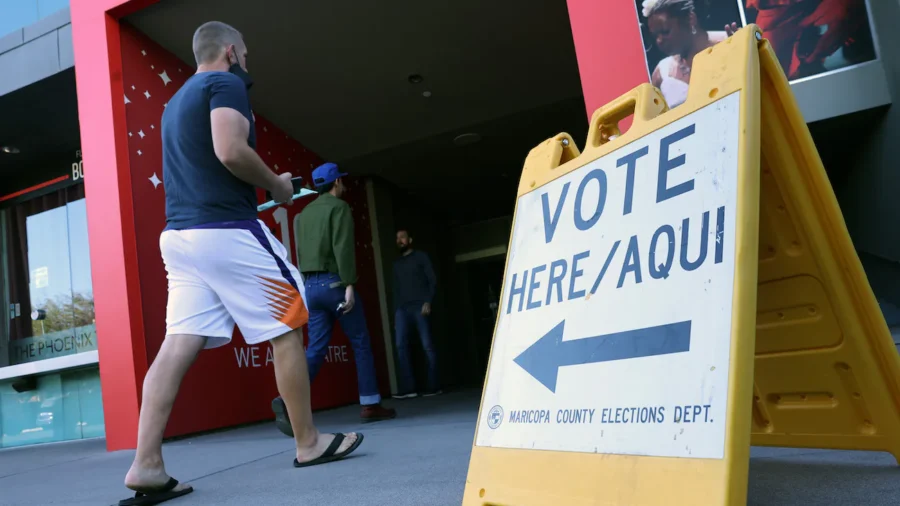A Supreme Court ruling late on Nov. 27 means that two senior Republican lawmakers in Arizona will have to testify about why they support state laws that require people to present proof of U.S. citizenship in order to vote in federal elections.
The lawmakers have argued, so far unsuccessfully, that they enjoy a recognized privilege against testifying about the legislative processes that were involved in the passage of two Arizona voting laws. Such a privilege is necessary for good government and prevents judicial second-guessing of the lawmaking process, Republicans say.
Democrats oppose both of the state laws in question, claiming they are part of a long-running Republican effort to suppress Democrat votes. Republicans, on the other hand, say the laws are needed to assure election integrity, especially in Arizona which they say has experienced irregularities in recent elections.
The U.S. Department of Justice, the Democratic National Committee (DNC), and activist groups sued over the laws, arguing that they were inconsistent with federal laws and were created in order to unlawfully discriminate against voters.
Despite this, Arizona Attorney General Kris Mayes, a Democrat, refused to defend certain provisions in the statutes.
The Supreme Court refused to lift the Sept. 14 order of federal district judge Susan Bolton in Arizona who directed Ben Toma, speaker of the Arizona House of Representatives, and Warren Petersen, president of the Arizona Senate, to attend a deposition in a lawsuit brought by Democrats and activist groups. Judge Bolton was appointed in 2000 by President Bill Clinton.
Specifically, the two lawmakers are expected to be asked why they supported two Arizona laws known as H.B. 2243 and H.B. 2492.
H.B. 2243 allows the cancellation of registration if county officials have a “reason to believe” the person is not qualified to vote or lacks U.S. citizenship. H.B. 2492 requires proof of U.S. citizenship to vote.
Judge Bolton struck down parts of H.B. 2492 and is moving to trial in a lawsuit challenging both laws.
The case is Toma v. United States District Court for the District of Arizona (court file 23A452).
The emergency application (pdf) was filed on Nov. 20 by Mr. Toma and Mr. Petersen.
The Supreme Court’s one-sentence order dismissing the application was issued late in the business day on Nov. 27. It was unsigned and no dissents were recorded. The court did not explain why it denied the request, which had originally been sent to Justice Elena Kagan, who in turn referred it to the full court.
The lawmakers said in the application that the district judge erred in ordering them to testify “about their personal motives for voting to enact two Arizona statutes … and their personal involvement in the legislative process, and to produce documents related to the passage of those laws.”
The judge issued a recent clarification saying that the plaintiffs in the lawsuit will be allowed to ask questions about what lawmakers said to each other in the process of getting the legislation approved.
The order “plainly violates the legislative privilege which applies where legislators or their aides are ‘acting in the sphere of legitimate legislative activity,’” the application stated, citing Supreme Court precedent.
In addition, federal courts have long taken the position that it is “not consonant with our scheme of government for a court to inquire into the motives of legislators[.]”
The lawmakers also argued in the application that the district judge erred in finding that Mr. Toma and Mr. Petersen “had waived their legislative privilege simply by intervening in the underlying case (after the Arizona Attorney General took the position that portions of the Voting Laws are preempted by federal law) and denying Plaintiffs’ claims—even though an Arizona statute expressly allows them to intervene and be heard in cases involving constitutional challenges to state law.”
The DNC said in a brief (pdf) that the lawsuit was initiated to “challenge two Arizona election laws enacted last year, laws that make it harder to register to vote, harder to stay registered, and harder to cast a ballot.”
The two lawmakers were not originally parties to the lawsuit and “instead injected themselves into the case—after the litigation had been underway for more than a year.”
They then “made assertions about a key disputed question of fact—whether the Arizona legislature passed the challenged laws with discriminatory intent,” after which the plaintiffs moved to compel their testimony, the DNC said.
The U.S. Court of Appeals for the 9th Circuit ruled against the lawmakers, prompting their emergency application to the Supreme Court.
The Epoch Times reached out to the DOJ for comment but had not received a reply as of press time.
The Epoch Times also asked the lawmakers’ attorney, Kevin O’Malley of Gallagher and Kennedy in Phoenix, Arizona, and Seth Waxman, attorney for the Arizona Democratic Party and the DNC, to comment but no replies were received by the time of publication.
Mr. Waxman works for Wilmer, Cutler, Pickering, Hale, and Dorr in Washington and was U.S. solicitor general under President Clinton from November 1997 to January 2001.
From The Epoch Times


